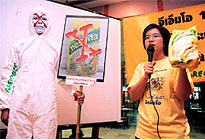Greenpeace exposes high amount of GMOs hidden in popular food products

Nesvita, Tesco Chinese Sausage use GMO ingredients but not labeled, Greenpeace calls for stricter labeling law.
Bangkok, 12 November 2003 – Environmental group Greenpeace today revealed that independent tests have found Tesco Lotus’ Chinese Sausage and Nestle’s Nesvita to contain a large amount of genetically modified soya. But despite the large presence of GMO soya, the products have not been labeled owing to the weakness of Thailand’s labeling law.
Last month, samples of Tesco Chinese Sausage and Nesvita were sent for testing at GeneScan, a leading independent laboratory in Germany which specializes in GMO testing. Results of the tests found out that 80 percent of the soya used as ingredient in Nesvita were GMOs, while 83 percent of the soya used in Tesco Chinese Sausage were GMOs.
“The loopholes in the labeling law allow multinational companies to dump GMO soya into Thailand. It is time to make this law stricter to protect consumers and give them a genuine right to know,” said Varoonvarn Svangsopakul, Genetic Engineering Campaigner of Greenpeace Southeast Asia.
The Labeling Regulation, which came into force on May 11, 2003 requires that only the 3 main ingredients have to be tested for GMO content, which means that even if the 4th ingredient contains GMOs, it will escape labeling. GMO contamination of up to 5% is allowed in these 3 main ingredients; and only genetically engineered soya and genetically engineered corn is covered. Other genetically modified food crops are ignored
For years Greenpeace has been campaigning for a lower labeling treshold of 1 percent across all food ingredients.
According to Varoonvarn, these two are just examples of products that have escaped labeling, which raises the question: how many other products out there contain GMOs but are not labeled?
Some companies are even using the weak labeling law to expand their GMO products and continue their experiment on the Thai public.
Nestle, for example, is heavily promoting SoyPlus which is labeled to contain GMO soya. And just before the labeling law was enacted, Nesvita’s soya content included 7 percent of GMO soya. At present, however, Nestle has increased its GMO content to 80 percent as the test found out.
Both Nestle and Tesco Lotus are in the Black List of Greenpeace’s True Food Shopping Guide because of their policies to use GMOs in food products.
Source: Greenpeace (http://www.greenpeace.org)